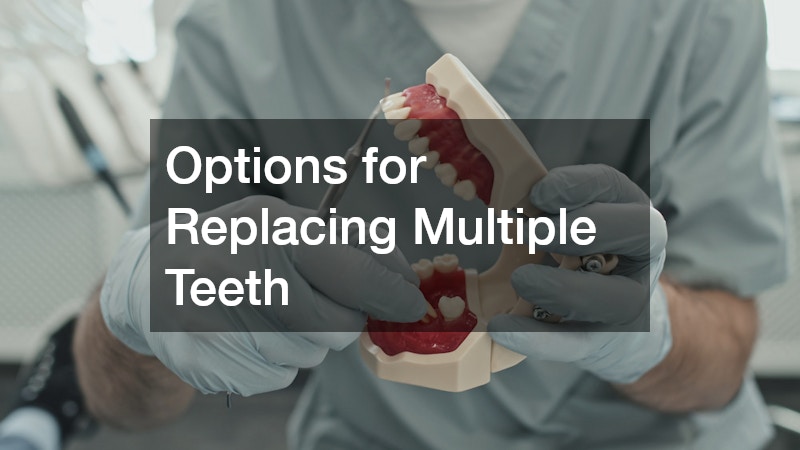Most people know they should see a dentist regularly, but not everyone understands exactly what “regular” means—or why it’s so important. Maintaining a healthy smile goes far beyond brushing and flossing. While those daily habits form the foundation of oral hygiene, they’re only part of a bigger picture. The other key component is routine, professional dental care that keeps your teeth and gums in their best condition year-round.
A healthy mouth impacts your overall well-being more than you might think. Oral health has been linked to heart health, diabetes control, respiratory function, and even pregnancy outcomes. Gum disease, untreated cavities, and oral infections can lead to pain, difficulty eating, and a lower quality of life. By prioritizing regular visits to your dentist, you can prevent many of these problems—or at least catch them early, when they’re easier and less expensive to treat.
The term “routine dental services” may sound simple, but it encompasses a wide range of preventive, diagnostic, and maintenance treatments. It’s not just about getting a cleaning twice a year. It’s about creating a consistent plan for monitoring your oral health, addressing minor concerns before they escalate, and exploring specialized treatments when necessary.
In this in-depth guide, we’ll take a tour through the different aspects of routine dental care, from the first appointment to cosmetic improvements, orthodontics, whitening treatments, and solutions for missing or damaged teeth. You’ll also learn how to choose the right provider for your needs, care for sensitive teeth, and know what to do when dental emergencies happen.
Think of this as your personal roadmap through the sometimes confusing world of dental care. By the end, you’ll have a clear understanding of how to navigate different services, what to expect at each stage, and how to make the most of every visit to keep your smile healthy and bright.
Starting Your Journey to Better Oral Health
Excellent oral health starts with scheduling—and keeping—a dentist appointment. Many people delay their visits until something is wrong, but that’s the opposite of how routine dental care is designed to work. The whole point is to prevent problems or catch them early, so treatment is easier and less invasive.
At your first appointment, you can expect a combination of discussion, examination, and cleaning. Your dentist will ask about your medical history, medications, and any symptoms you’ve noticed. They may take X-rays to check for cavities, bone loss, or hidden dental issues. A hygienist will perform a thorough cleaning, removing plaque and tartar that regular brushing and flossing can’t eliminate.
Many patients feel nervous about their first appointment in years, worrying that they’ll be judged for neglecting their care. But modern dental professionals focus on solutions, not criticism. If it’s been a while since you’ve seen a dentist, remember: the best time to restart is now. Routine visits every six months—or as often as your dentist recommends—will keep you on track and reduce the likelihood of major issues in the future.

Enhancing Your Smile’s Appearance
Not every visit to the dentist is about fixing a problem. Sometimes, it’s about making something that’s already healthy look even better. Cosmetic dentists specialize in improving the appearance of your teeth, gums, and bite, and they often work closely with general dentists to ensure that aesthetics and health go hand in hand.
While routine dental checkups focus on function and prevention, cosmetic services address concerns like discoloration, chips, uneven spacing, and misshapen teeth. Common treatments include porcelain veneers, dental bonding, gum contouring, and enamel shaping. Even subtle enhancements can have a dramatic impact on your confidence.
It’s worth noting that cosmetic improvements are easier and longer-lasting when your teeth and gums are already in good health. That’s why many cosmetic procedures are discussed during regular checkups—they’re a natural extension of a complete dental care plan.
Straightening and Aligning Your Teeth
If your teeth are crowded, crooked, or misaligned, your general dentist may refer you to an orthodontist. This specialist focuses on aligning teeth and correcting bite issues using braces, clear aligners, and other devices, tailoring treatment to each patient’s unique needs and oral structure.
Straight teeth aren’t just about aesthetics—they’re easier to clean, which reduces the risk of cavities and gum disease. Misalignment can also cause jaw pain, headaches, difficulty chewing, and uneven wear on your teeth. During routine dental visits, your dentist can monitor your bite and recommend early intervention if they see alignment issues developing.
Modern orthodontics offers more options than ever before. In addition to traditional metal braces, patients can choose ceramic braces, lingual braces (placed on the back of teeth), or nearly invisible clear aligners. Your dentist and orthodontist can work together to decide which option fits your goals, lifestyle, budget, and long-term oral health plan.

Achieving a Brighter, Whiter Smile
Over time, everyday habits—like drinking coffee, tea, red wine, or consuming certain dark-colored foods—can stain your teeth. Even with perfect oral hygiene, natural aging, smoking, or enamel wear can cause enamel to thin and dentin (the layer beneath) to show through, giving teeth a darker appearance.
During a routine dental visit, your provider can recommend the best teeth whitening treatments for your specific situation. In-office whitening, which uses stronger bleaching agents and sometimes light activation, can produce noticeable results in a single appointment. At-home whitening kits from your dentist offer professional-grade results over a longer period and can be tailored to your schedule and comfort level.
Professional whitening is generally safer and more effective than over-the-counter products, especially for patients with sensitive gums, prior dental work, or uneven enamel. Your dentist can ensure the process is fully customized to your teeth’s condition and desired shade, avoiding uneven whitening, irritation, or other complications.
Permanent Solutions for Missing Teeth
Missing teeth affect more than your smile: they can lead to bone loss, shifting teeth, difficulty chewing, and even changes in speech or facial structure over time. One of the most durable solutions is tooth implants, which are artificial tooth roots surgically placed into the jawbone and topped with realistic crowns that blend seamlessly with your natural teeth.
Even though implants are a specialized procedure, routine dental visits are key to identifying when you might need one. Your dentist can thoroughly evaluate whether an implant is right for you, considering factors like bone density, gum health, overall oral condition, and long-term dental goals. They’ll also be involved in post-procedure care, ensuring the implant remains secure, healthy, and functional for years to come.
Implants are designed to last decades with proper care, making them a worthwhile investment for both appearance and oral health. In addition to restoring function, they help preserve jawbone integrity, maintain facial structure, and provide a reliable foundation for chewing and speaking naturally, contributing to long-term overall well-being.

Options for Replacing Multiple Teeth
When multiple teeth are missing, denture services provide a practical and effective way to restore chewing function, speech clarity, and facial support. Today’s dentures are far more advanced than in the past, offering improved fit, comfort, durability, and a natural appearance that helps patients maintain confidence in their smile.
Your routine dental provider can help determine whether full dentures, partial dentures, or implant-supported dentures are best for your unique needs, lifestyle, and oral structure. They’ll also handle adjustments over time to ensure proper fit and comfort as your mouth changes, preventing irritation or misalignment.
Regular checkups are crucial for denture wearers to prevent sore spots, monitor gum and bone health, and ensure your dentures continue to function properly. Additionally, consistent visits allow your dentist to spot potential issues early, provide professional cleaning for dentures, and offer guidance on proper daily care to extend the lifespan of your prosthetics.
Caring for Delicate or Easily Irritated Teeth
Sensitive teeth can deter individuals from enjoying everyday activities, such as drinking hot coffee, eating ice cream, or biting into hard foods, due to discomfort. Understanding the care for sensitive teeth begins with a routine dental consultation, where your dentist can thoroughly examine your teeth, identify the underlying cause, and recommend effective solutions.
Specialized toothpaste, fluoride treatments, protective sealants, and other tailored procedures can reduce sensitivity and strengthen enamel. Regular dental visits help monitor the progress and effectiveness of these treatments, ensuring adjustments are made if needed for optimal results.
Additionally, your dentist may suggest lifestyle adjustments, such as avoiding extremely hot or cold foods, acidic beverages, or harsh brushing techniques that could trigger sensitivity. A proactive and consistent approach in caring for sensitive teeth can greatly alleviate discomfort, improve daily comfort, and help maintain long-term oral health.

Comprehensive Care for All Ages
Oral health begins in childhood and continues through every stage of life. Family dentistry addresses oral health at every age, providing tailored treatments ranging from pediatric care to adolescent guidance, adult preventive care, and geriatric oral health management.
Associating with a family dentistry practice ensures routine dental care that adjusts to the developmental and aging-related changes in dental health. Regular dental evaluations for children help prevent decay, monitor growth and jaw development, and establish healthy habits early on that can last a lifetime.
Family dentistry can also manage aging-related dental issues, such as dry mouth, gum recession, tooth wear-and-tear, and sensitivity for adults and seniors. By providing consistent, personalized care for every family member, these practices help ensure a lifetime of healthy, confident smiles, while fostering comfort and trust in every visit.
Finding the Perfect Fit for Your Smile
Finding the right local dentist who meets your specific needs requires considering several factors, including expertise, approachability, technology, and convenient location. Establishing a strong relationship with your dentist facilitates open communication and custom-tailored care, which is essential for effective and comprehensive dental treatment over time.
When choosing a local dentist, consider their specialization, experience, and the range of services they offer. It’s also beneficial to read reviews, ask for recommendations from friends or family, and possibly schedule a consultation to gauge comfort, communication styles, and office environment.
Routine dental appointments are not only about maintenance, but also about having a trusted professional who understands your oral health history and unique needs. This personalized attention, combined with consistent care, is key to preventing problems, improving outcomes, and ensuring long-term dental health and overall satisfaction.
Getting Help When It Can’t Wait
Dental emergencies can occur without warning, and timely access to emergency dental care is crucial. Whether it’s a broken tooth, acute pain, severe trauma, or an infection, emergency dental services ensure that you receive immediate and effective treatment to preserve your oral health and overall well-being.
Many dental offices offer emergency appointments and are equipped to handle urgent dental issues, including tooth fractures, lost fillings, and abscesses. It’s important to know the contact information of a dental care provider who offers emergency services so you can act quickly when time is critical.
Having an emergency dental care plan in place can relieve the anxiety associated with potential dental emergencies. Quick and competent care reduces the risk of further complications, saving not only your teeth but also preventing additional discomfort, prolonged recovery, and unnecessary stress for you and your family.
Routine dental care is more than just a cleaning every six months—it’s a proactive and comprehensive plan for lifelong oral health. From the first dentist appointment to specialized treatments like whitening, implants, orthodontics, and preventive procedures, each service plays an important role in keeping your smile healthy, functional, and beautiful. Consistent care allows your dentist to catch small issues before they become larger problems, reducing the need for extensive or costly treatments in the future.
Whether you’re seeking cosmetic improvements, replacing missing teeth, addressing sensitivity, or finding a provider for your entire family, understanding your options helps you make informed decisions that suit your lifestyle and long-term goals. And when unexpected emergencies arise, having a trusted dentist already in your corner ensures quick, effective action, minimizing discomfort and protecting your oral health.
By committing to regular visits, addressing problems early, and working with a provider who understands your unique needs, you can maintain not only a healthy, confident smile but also a sense of control and peace of mind about your overall dental care for years to come.
